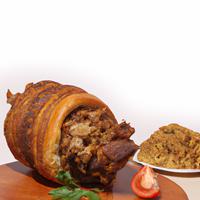
1 serving (200 grams) contains 350 calories, 15.0 grams of protein, 25.0 grams of fat, and 20.0 grams of carbohydrates.

Log this food in SnapCalorie

Nutrition Information
Calories |
411.8 | ||
|---|---|---|---|
% Daily Value* |
|||
| Total Fat | 29.4 g | 37% | |
| Saturated Fat | 11.8 g | 59% | |
| Polyunsaturated Fat | 0 g | ||
| Cholesterol | 117.6 mg | 39% | |
| Sodium | 941.2 mg | 40% | |
| Total Carbohydrates | 23.5 g | 8% | |
| Dietary Fiber | 3.5 g | 12% | |
| Sugars | 2.4 g | ||
| protein | 17.6 g | 35% | |
| Vitamin D | 0 mcg | 0% | |
| Calcium | 58.8 mg | 4% | |
| Iron | 2.4 mg | 13% | |
| Potassium | 352.9 mg | 7% | |
* Percent Daily Values are based on a 2,000 calorie diet. Your daily values may be higher or lower depending on your calorie needs.
Food Attributes
Source of Calories
About Kokorec
Kokoreç is a traditional dish originating from Turkish and Balkan cuisine, made primarily from seasoned and grilled lamb or goat intestines. The intestines are cleaned thoroughly, spiced with herbs like oregano and red pepper, and wrapped around sweetbreads or other offal, then cooked on a rotating grill. Typically served finely chopped inside bread or on a plate, kokoreç offers bold and savory flavors. It is rich in protein and iron due to its organ meat content, which can provide essential nutrients. However, kokoreç is also high in cholesterol and saturated fats, requiring moderation for a balanced diet. Spices used in the dish, such as thyme and cumin, contribute antioxidants and potential digestive benefits. While kokoreç is beloved for its unique taste, its nutritional profile makes it a dish best enjoyed occasionally as part of a diverse and mindful eating plan.



